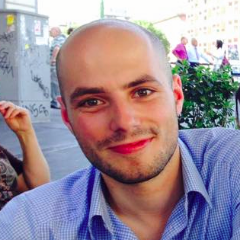What does it take to stage Simon Boccanegra convincingly? A cast with enough quality and depth to cover the work's numerous main roles is a must. And staging capable of clearly presenting its complicated storyline certainly helps. But the main requisite is a conductor that knows what to do with the music. Verdi's extraordinary score, after all, does much of the legwork of driving the action.
On previous outings, Federico Tiezzi's production has looked strong, mainly for its clarity and its tendency to steer clear of potentially confusing reinterpretations, but it makes less of an impact this time around. Pier Paolo Bisleri's quasi-abstract minimalist sets had felt well-attuned to the gloomy quality of Verdi's score. Now they feel oddly drab, and the occasional pockets of colourful period detail Bisleri provides, such as a gold throne and panelling for the Council Chamber Scene, fail to capture their original resplendence.
The biggest problem, though, is that while Tiezzi makes much use of extras, for example with writhing women in mourning that carry Maria Fiesco's body across the stage during the Prologue, singers are seemingly left to their own devices. This might be surprising, considering Tiezzi – primarily a theatre director and a proponent of Grotowski's methods – is known for his attention to physical detail. But he is not the first theatre director to appear stumped when given singers to work with.
We are therefore grateful that conductor Myung-whun Chung is on hand to provide enough orchestral colour to make up for the deficit onstage. If Chung is sometimes hailed as the greatest living conductor of Verdi, here was a performance to support that claim. He draws extraordinary depth of colour from the orchestra, which spluttered, seethed and, in the case of the music for the garden scene, soared its way through Verdi's score. Particular to the conductor's approach is the sense of freedom with which he draws the lines and applies the colour. But an iron rhythmic column ran through this reading, so that when the music shuddered or pulsed steadily like a heartbeat it packed a punch.
This was an evening to shut your eyes and enjoy the music, not least because the starry cast delivers the goods. Hands-off direction meant that onstage chemistry between characters was often minimal, and, with the prompter's box in use and some of the ensemble numbers very rocky, one sensed singers were finding their feet in this first performance of the run. There were, however, some wonderful individual performances. Krassimira Stoyanova's dark, weighty tone did not allow you to imagine Amelia as the youthful force we often get, but the soprano's characterisation was so committed, and her singing so sumptuous, that it hardly mattered. Dmitry Belosselskiy was thunderous as Fiesco, thrilling is his raging aria "Il lacerato spirito”, and Fabio Sartori was an exceptional Gabriele Adorno, his highly dramatic "Sento avvampar nell'anima" a vehicle for stonking singing that brought the house down. Dalibor Janis sounded underpowered, but was adequately mysterious to convince as the shadowy Paolo.
Leo Nucci, in the title role, provided the most impressive performance of all, making as big an impact as he did in the same role four years ago. The intertwining dramatic threads that form this multidimensional role − the flourishing relationship with Amelia, the noble calls for peace between Genoa and Venice, the poison-induced demise − were vividly brought to life in Nucci's hands. "Plebe Patrizi Popolo" was a masterclass in how to craft a text for emotive effect. As long as La Scala can source such a persuasive cast, this flawed Boccanegra is worth a watch.




